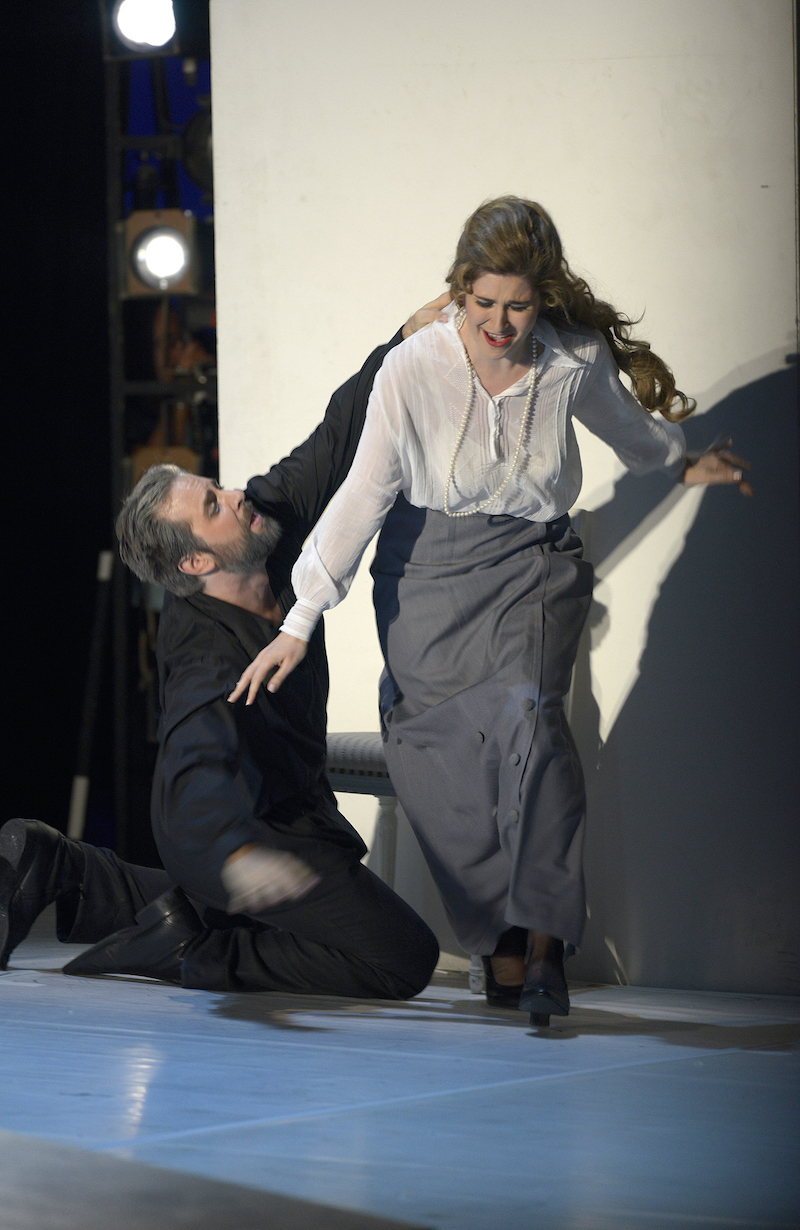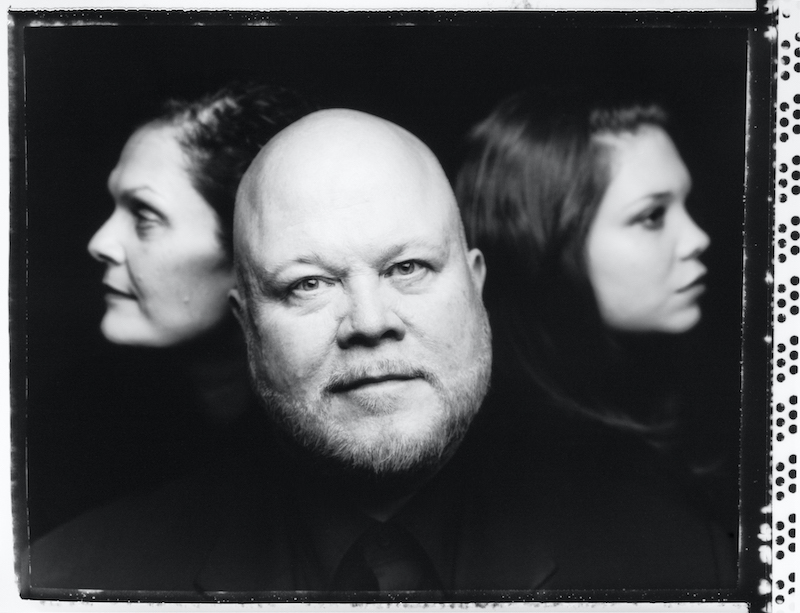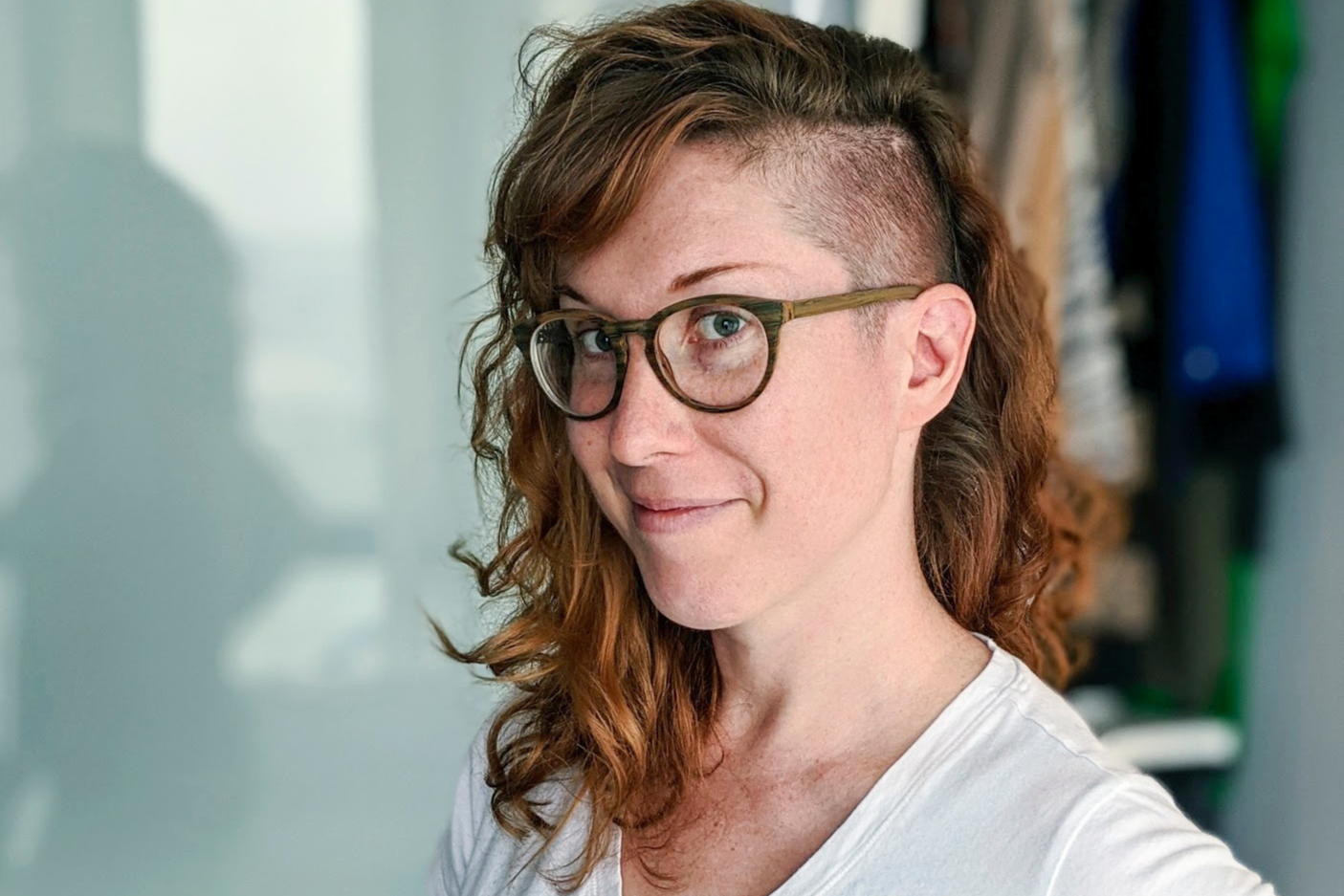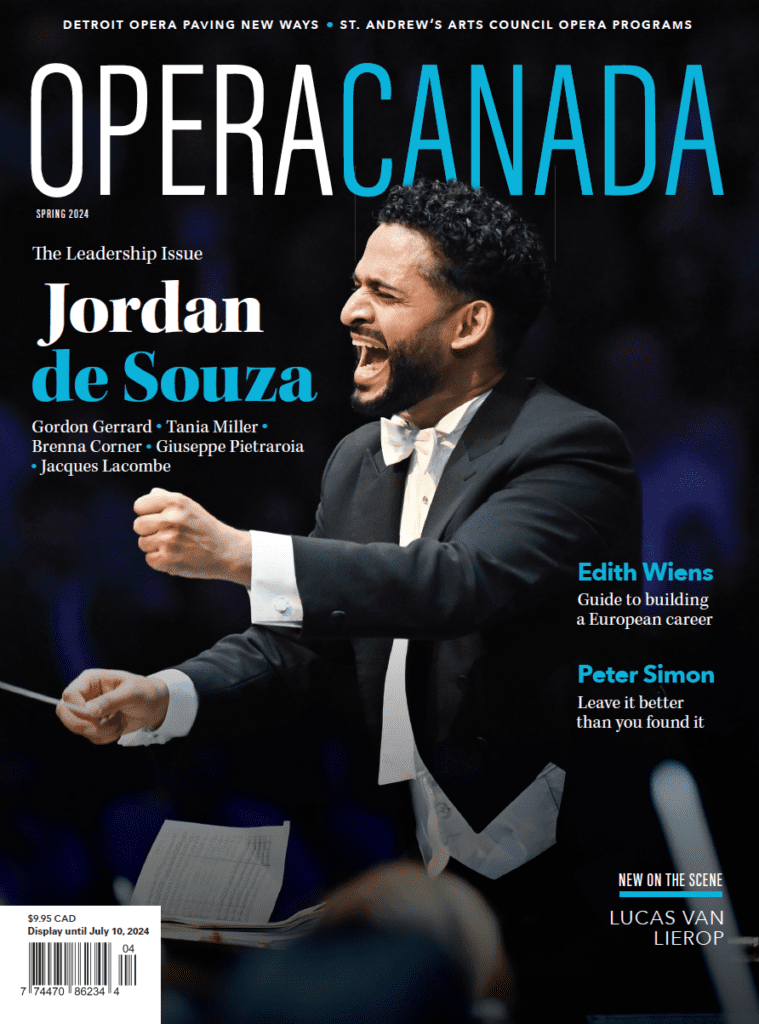The feature, “Finding the Balance: Opera Singers with Kids” originally appeared in the Fall 2019 issue of Opera Canada, Vol. 60 #1
About 25 years ago, Richard Margison was homesick in Berlin. It was a familiar feeling in those years, when the Canadian tenor’s robust singing career kept him away from his family for 8-10 months of the year. At the time, their daughter, Lauren, was a toddler, and in this particular instance of missing home, Margison decided to distract himself by going to the incredible Berlin Zoo.
“Of course, every damn animal in the zoo had a baby,” he laughs, bittersweetly. “And that just destroyed me.”
He tried souvenir shopping, too. He went out and bought “all these ridiculous Bavarian outfits for little kids,” anticipating the fun of playing dress-up with Lauren. “By the time I got home, they were too small.”
“It’s rough,” says Margison, still smarting from the memories even now, with his daughter grown and his family intact. “It’s really rough.”
The industry line goes thus: opera singers aren’t paid to do what they love, they’re paid to be away from the ones they love. Most singers learn this early in their careers, after missing those first few family holidays, weddings, baby showers, or big birthdays. By the time they’re thinking of starting families, the stakes are high enough that some decide to bow out of the industry.
Yet at that same crisis point, there are singers who soldier forward with their concurrent plans to be an opera singer and a parent. I don’t know how they do it; having children is hard enough without adding things like international health insurance and extra plane tickets. These singers aren’t masochists, though; they’re doing it because it’s fulfilling, at least more so than it is exhausting. And if you’re the type of person who can keep a level head when the going gets tough, there are rewards to reap.
YOU DISCOVER THAT YOU’RE TOUGHER THAN YOU THINK
On the morning of her first rehearsal for Eugene Onegin at Paris Opera, soprano Nicole Car wasn’t feeling particularly prepared. Her son, Noah, was just two months old, and there was already a hitch in her carefully laid plans for the day: her breast pump was on the fritz, and she was going to be late. “It was so stressful!” she recalls. “It seems like such a bad excuse when all you want to do is make sure you’re there, prepared and ready to go.”
Both Car and baby made it through that day, and moved on to all the subsequent bouts of juggling career and child. And as her rehearsals continued, Car’s husband, Canadian baritone Étienne Dupuis, did his own balancing act. “I learned Don Giovanni during Noah’s naptime,” he smiles. “It was a really beautiful time with him.”
Of course, there are times where something has to give. Canadian soprano Layla Claire, when she became pregnant with her first daughter, had to cancel upcoming performances as Pamina in The Magic Flute at Metropolitan Opera. “It was heartbreaking,” she says. “The performances were the weeks of my due date, so there was no way around that.”
And when these opera singer parents aren’t forfeiting gigs or struggling to replace a breast pump in Paris, there are the days of so-called normalcy. As baritone and father of three, Craig Irvin, puts it, “It was either dealing with babies, or dealing with music. And it all became one big blur.”
It’s a reality that is far removed from the ideal. Opera singers are creatures of routine—for some, it’s almost a superstition—to give a wide berth for things like solo practice time, exercise, drinking litres of water, and the holy grail of it all, sleep. And when life (kids, really) gets in the way of that routine, it takes a toll on a singer’s body, and inevitably, their mental readiness for the stage.
This goes for fathers as well as mothers. Noah was a newborn by the time Dupuis was in Montréal preparing to sing in the Pink Floyd-inspired opera, Another Brick in the Wall. “I have no recollection of that show,” he laughs. “I would literally go to the opera, put the costume on, and then just think, ‘what’s my next word?’ And do that every night.”
Before having kids, Claire was a firm believer in 9+ hours of sleep each night and a relaxed practice method (“have tea and get back to it when I feel like it”). Now, with a limited time for precious solo practice, she’s a believer in concentration. “It’s given me a new sense of discipline that I didn’t have before,” she says with a laugh. “I don’t have all day to practice and have tea and get back to it when I feel like it.”
And Claire, like so many professional mothers, adapted. “Like most singers, [I was] precious about things: sleep, eating, hydration, rest. Just all of these things that we think we need. And then when you have babies and no time to take care of yourself in the way you could have before, you realize that you’re a lot tougher and you’re a lot more flexible than you think you are.”
PREGNANCY TEACHES YOU ABOUT SINGING—AND THE SINGING BUSINESS
In 2018, when French soprano Julie Fuchs was fired from the Hamburg State Opera after announcing her pregnancy—which would have had her singing Pamina in The Magic Flute while in her second trimester—many opera singers got a bit spooked. Isn’t it an old idea that pregnancy cancels out a woman’s ability to work?
“When I first started in the business, I would have questions asked of me: ‘are you planning on having kids?’” Canadian soprano Lara Ciekiewicz, whose own personal plans don’t include having children, still felt the industry bias against women. “It made me think: on the business side of things for some people, [pregnancy] is a strike against you.”
There was some reassurance, at least, in the public outrage over Fuchs’ firing, and the resulting lawsuit that ended favourably for the soprano. And it seems that for every company who mishandles things like a pregnancy announcement, there are a handful more getting it right. Claire had good experiences with the companies she worked for during her pregnancies, particularly in European houses. “There’s less stigma, less weirdness about it in Europe,” she posits.
Car, too, found plenty of support at work after her son was born. “I think the arcane idea is that once a woman has a child, her career is basically over,” she says, adding quickly, “but it doesn’t happen anymore.”
That’s great news, particularly since pregnancy can offer an opera singer a decidedly unique window into her vocal technique. When I spoke with Claire, she was in Copenhagen to work with a vocal technician whom she found particularly helpful in getting her postpartum body back in shape to sing. “I learned some interesting things about my support, most importantly after giving birth.”
Pilates, pelvic floor work, and classic slow-and-steady technical work with the voice: it was a conscious recovery effort that Claire made, which led to a few lightbulb moments. “Going through pregnancy is eye-opening, when you see how amazing your body is and what it can do,” says Claire. “You have a new appreciation for your body, and translating that into singing is kind of interesting.”
IT’S EASIER NOW THAN IT’S EVER BEEN
No, it’s not easier to spend time away from loved ones, but it’s certainly the easiest, and cheapest, that it’s ever been for long-distance families to stay in touch. “We kept Bell Telephone in existence for the first two decades,” Margison jokes of his time spent on the road, recalling annual phone bills of over $20,000. “We didn’t go a single day without talking for an hour on the phone.”
Margison also grew strategic about the international work he took, largely staying within North America so that even if he had a small break of two or three days, a flight home was still feasible. No easy commute, of course, yet “it certainly meant a lot to the soul and the heart.”
Today, there are more flights, and they’re easily booked and paid for online. Expensive phone calls have given way to video chats and all-day texting. And if the family travels as a unit – like Car and Dupuis, or Claire and her husband, baritone John Chest—there’s an app, or at least a Facebook group, for anything they may need while on the road. Apartment sharing, babysitter and nanny recommendations, kid-friendly activities in various cities, even the exchange of items like cribs, car seats, and strollers, are made easier by the internet.

Nicole Car (Tatyana) and Étienne Dupuis in the title role of Deutsche Oper Berlin’s Eugene Onegin. Photo: Bettina Stöss
Even the industry itself feels more welcoming to singers with kids. Car and Dupuis have managed precious weeks where they can work together in the same city at the same time, thanks to help from their agents and the companies involved. “When companies work this way,” says Dupuis, “it gives us faith in humankind.”
IT MAKES YOU WORK ON YOUR RELATIONSHIPS
Ask any working singer: long-distance relationships are brutal. Though a busy calendar bodes well for business, the time spent apart from loved ones takes its toll, and not every family weathers it well. Before Claire and Chest had kids, they looked to colleagues for clues to their future. Among married couples who both work as singers, “we didn’t find a lot of examples of people who were doing it, where the marriage survived, the kids were happy, and the career survived.”
No matter what they do for a living, most adults know—or learn, eventually—that lasting relationships take work; long-distance relationships take more work. Margison and his wife, Valerie Kuinka, herself a violist, stage director and arts administrator, did that work for 20 years, which included saving an hour or two each day to speak on the phone. You could argue that the Margisons talked more than the average family who doesn’t spend time apart.
The singing career puts relationships to the test. On the one hand, those tests are a bit unfair: is it not natural to develop distance or resentment between loved ones, when they’re running short on time spent face-to-face? Yet on the other hand, if a relationship isn’t strong enough to withstand the separation, all parties will find out sooner rather than later. Like a tough-love sort of mercy, the opera singer’s career quickly lays out a relationship obstacle course, where the finish line is reserved for those who put in the hard work.
“The most important thing is family,” says Car, echoed enthusiastically by Dupuis. “We love our careers, we love our work, but we love our family more than that.”
Claire and Chest have an attitude that particularly stands out. When one of them has a gig, the family comes along not to follow the working parent, but because it’s the whole family that’s working. “It’s, ‘we’re going to do Così,’” says Claire. “You have to look at each gig like that, as a family.” It’s an approach that underlines the support Claire and Chest have for each other’s careers, and wards off any inklings of professional competition.
“It is possible to do it and have a happy marriage,” Claire says, confidently. “You can’t be competitive with each other, that’s for sure.”
IT MAKES YOU A BETTER ARTIST
Singers are always looking for a new source of inspiration—a not-easy task in opera, where the emotional stakes are high and the plots, oft-exaggerated. As they rack up life experience, singers can feel themselves connecting more and more deeply with the characters they play, and having kids certainly helps this process along.
“Having kids opened me up to more emotions. It widened my spectrum of joy and despair,” says Irvin, who soon takes that emotional spectrum to his eighth production of Kevin Puts’ Pulitzer Prize-winning opera, Silent Night. “The highs get higher, the lows get lower. That’s my experience in having kids.”
Car, even with her son still young, has already seen what motherhood does to her work. “I dread and look forward to the day I sing my first Madam Butterfly,” she says, half joking about Puccini’s famed heroine who loses her son, “because it will utterly destroy me.” (And that’s what opera audiences are looking to see, right? A soprano wearing her whole heart on her sleeve?)
And when kids aren’t just helping their parents experience unnerving emotional peaks and valleys, they’re great for perspective. I’ll admit this: when my son was born, I felt a new, distinct distance between me and opera. It was strange, to see one of my life’s passions fade into the realm of indifference, my interest and attention entirely pulled toward my baby.
There’s something that must be said, though, about the people who make the decision to leave the opera industry, or significantly lessen their time spent in it, specifically because they prefer to focus on their kids. I’m one of those people, who walked away from a busy schedule as a voice coach and répétiteur, and it’s part of why writing this piece appealed to me.
I can’t be the only one who discovered that her love for opera was easily bested by her love for her family, when family indeed came along. It’s a confusing, disorienting feeling: part of you feels as though you’re betraying your craft, as though you’re a fair-weather friend who stops hanging out with opera once you have a spouse and child. Since a career in opera can be so damn difficult, having a good excuse to leave it can feel like a guilty pleasure.
And in my case, I felt as though I had been fooled, pranked, even, by my own biological clock; apparently, I was not the staunchly child-free, smugly nomadic person who deemed the rehearsal room her most romantic of relationships. I was just another woman with baby fever and an urge to nest, and I was risking my career to run after my own hormones.
That’s the cynical, insecure part of the story. The other part is being honest with oneself, smart enough to know that you won’t be a good parent if you’re white-knuckling it, traveling far from the friends and extended family who can offer help, and spending unnecessary energy worried about irregular income or whether or not you can sustain a kid-friendly routine.
Claire, who always knew she wanted to have kids, also knows it’s “an important option” for adults to choose differently than she did. “A couple of my best friends have decided not to have children, because they think it would be too difficult, or they want to be able to focus entirely on their careers,” she says. “Hats off to them that they know that’s what they want to do.”
There’s a corollary to all of this, though; for singers who do maintain their careers as parents—it’s a very good sign that they are particularly committed to their craft.
“I used to get really stressed out,” says Claire of her life before children. “I was so busy, going from one thing to the next, I didn’t have time to think about what I was doing, or even enjoy what I’m doing.” This is a common symptom of the entrepreneurial hustle required of all young singers, and a hectic calendar like Claire’s is a sign of success.
And now, when the stakes are even higher, Claire has new clarity about what she wants out of her singing career. “When I’m away from my kids, I’d better be enjoying what I’m doing,” she says. “I actually enjoy my job a lot more, and I have a new love for it that I had sort of lost, before.”
Dupuis puts it slightly differently, if a bit morbidly: “When I’m on my deathbed, if I have any regrets, it will be something personal, not professional. If I never sing at La Scala, I won’t be thinking of that on my deathbed, at all.”
Jenna Simeonov manages Opera Canada‘s social media, and is Editor and co-creator of Schmopera.com. She’s also a pianist, vocal coach, and répétiteur, and working with singers is how she fell in love with opera.









